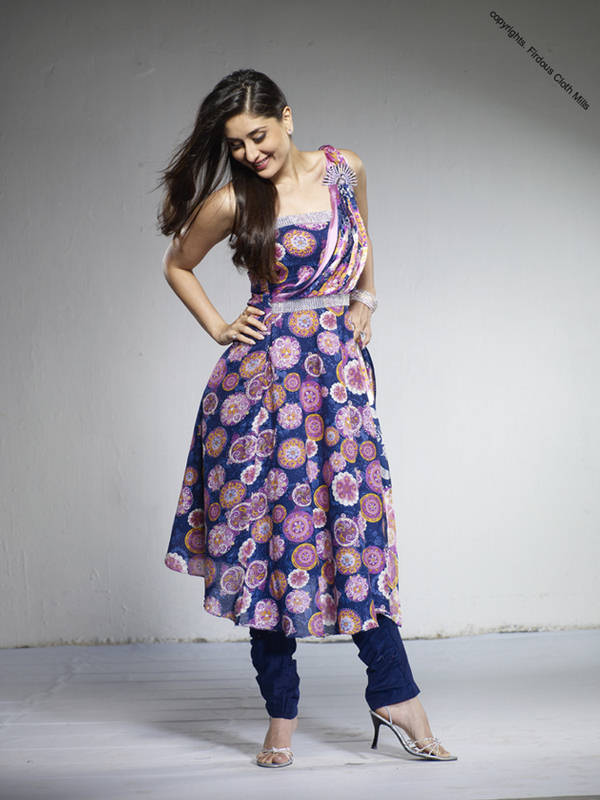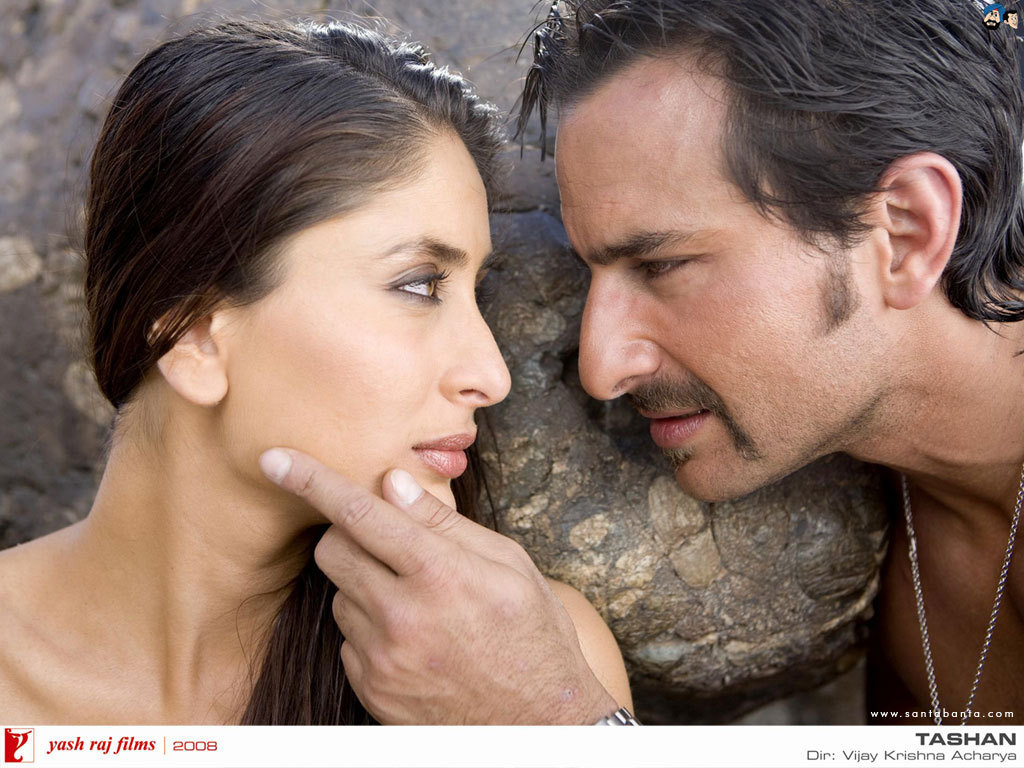Kapoor was initially scheduled to make her debut in Rakesh Roshan's Kaho Naa... Pyaar Hai (2000), opposite the director's son Hrithik Roshan. Several days into the filming, however, she abandoned the project and later explained that, "it was probably destined that I was not to be in the film. After all, it was a launch for his son. The whole focus was on the boy. Now I am glad I did not do the movie.She made her debut later that year in J.P. Dutta's war drama Refugee, alongside Abhishek Bachchan. Set during the Indo-Pakistani war of 1971, the film centers on a man known simply as "Refugee", who illegally transports civilians back and forth across the Indo-Pakistani border. Kapoor portrayed Naaz, a Bangladeshi girl who falls in love with Refugee while illegally migrating to Pakistan with her family. Her performance was acclaimed by critics; Taran Adarsh of Bollywood Hungama wrote that Kapoor "has a magnetic personality, which will make the viewer fall in love with her instantly. What surprises you is the ease with which she emotes the most difficult of scenes There is no denying the fact that she is a natural performer who is very camera friendly. the experience of making her first film, she described it as . a great learning experience. became the fifth highest-grossing film in India in 2000, Kapoor's performance earned her the Filmfare Award for Best Female Debut.In 2001, Kapoor appeared opposite Tusshar Kapoor in the romantic drama Mujhe Kucch Kehna Hai, which became one of the highest earners of the year. review in The Hindu, in regards to her performance, noted that she was "definitely the actress to watch out for, if her debut with Abhishek in Refugee and now Mujhe Kucch Kehna Hai are any indication shines throughout the flick, with the grace of a seasoned sizzler already. Kapoor next starred in Subhash Ghai's family drama Yaadein alongside Jackie Shroff and Hrithik Roshan. The drama centers on the character of Raj Singh Puri, a middle-class man, and his daughters' marriages. Kapoor played the part of the youngest daughter and Roshan's love interest, Isha Singh Puri. The film was met with negative reactions from reviewers and garnered poor box office returns. then appeared in the Abbas-Mustan thriller Ajnabee. The feature was adapted from the 1992 American thriller film Consenting Adults, and was a moderate box office success in India.
Later in the year, she starred in Santosh Sivan's period epic Asoka, a partly fictionalized account of the life of Ashoka the Great. It was widely screened across the United Kingdom and North America, and was also selected for screening at the Venice Film Festival and the 2001 Toronto International Film Festival. Featured opposite Shahrukh Khan who played Ashoka, Kapoor portrayed the character of Kaurwaki, a princess of Kalinga with whom Ashoka falls in love, and received her first Filmfare Best Actress nomination. While the film received generally positive reviews, Kapoor's performance received a mixed reaction from critics. Rediff.com concluded that "while a large portion of the first half is focused on the emerging romance between the runaway prince and herself and to their credit they do manage to whip up some on-screen chemistry, I am still unsure as to her acting abilities."[30] Meanwhile, David Rooney from Variety wrote, "Kapoor plays ornately tattooed Kaurwaki as a lively mix of flirtatious coquette and feisty warrior woman, kind of like J.Lo meets Michelle Yeoh."
Kapoor's final release of 2001 was Kabhi Khushi Kabhie Gham a melodrama, in which she was featured as part of an ensemble cast that included Amitabh Bachchan, Jaya Bachchan, Shahrukh Khan, Kajol and Hrithik Roshan. Directed by Karan Johar, the movie was a major financial and critical success and became India's second highest-grossing film of the year, as well as Kapoor's highest-grossing movie up until then. It also performed well internationally and became the biggest Bollywood success of all time in the overseas market up until then, earning over 1,000 million worldwide. Kapoor's performance as "Poo", a good-natured but superficial girl, was described as "one of the main ... highlights of the film her portrayal earned her a Filmfare Best Supporting Actress nomination
During 2002 and 2003, Kapoor experienced a setback in her career. She was in six filmsMujhse Dosti Karoge!, Jeena Sirf Merre Liye, Talaash: The Hunt Begins Khushi, Main Prem Ki Diwani Hoon, and the four-hour war epic of which proved critically and commercially unsuccessful in India's performances were often identified by critics as unoriginal and repetitive, with little inspiration. expressed concern that she was becoming typecast, but these negative reviews were fundamental in motivating her to improve her integrity as an actress in subsequent years by accepting more demanding roles
Critical acclaim As the prostitute "Chameli" in Chameli (2004), Kapoor's performance earned her much acclaim and garnered her the Filmfare Special Performance Award.
Following the negative period in Kapoor's career, 2004 marked the beginning of her work in more serious films, most of which would bring her critical acclaim rather than commercial success.[8] Under the direction of Sudhir Mishra, Kapoor portrayed the role of a prostitute in Chameli. The film relates the story of a young prostitute who meets with a widowed investment banker (played by Rahul Bose), and follows the development of their relationship as they share their devastating life experiences. When Kapoor was initially offered the role in 2002, she refused it, stating that she was reluctant to play a bold role at the beginning of her caree, when the director again approached her a year later, she agreed to do the film and viewed it as an opportunity to show the range of her acting skills. To prepare for the role, she visited several of Mumbai's red-light district areas at night to study the dress and mannerisms of sex workers. Chameli received predominantly positive reviews upon release and Kapoor's performance was generally well-received by critics, with the Indiatimes praising her "intuitive brilliance" and stating that she had exceeded all expectations. reviewer, however expressed concern that they found her portrayal unconvincing and excessively stereotypical, describing her as "sounding more like a teenager playacting than a brash, hardened streetwalker", and likening her mannerisms to that of a caricature.[38] Nonetheless, Kapoor's portrayal of Chameli garnered her the Filmfare Special Performance Awardand the film marked a significant turning point in her career as an She next co-starred in Mani Ratnam's bilingual project Yuva alongside Ajay Devgn, Abhishek Bachchan, Vivek Oberoi, Rani Mukerji and Esha Deol. The film, consisting of three chapters, tells the story of six individuals linked by a car accident. Kapoor is featured in the third chapter as Oberoi's love interest, Mira, a young witty woman. She was mostly criticised for taking a role of minimal importance, though her performance was generally well-received Subhash K Jha described her role as "fey and insubstantial", but further stated that "she turns these character traits to her own advantage to create a girl who is at once enigmatic and all-there, a bit like the film itself which is both mysterious and voluptuous then appeared alongside Amitabh Bachchan and Fardeen Khan in Govind Nihalani's critically acclaimed film Dev, which revolved around the 2002 Hindu-Muslim riots in the Indian state of Gujarat's role was that of a Muslim victim named Aaliya, modelled after Zaheera Sheikh, a key witness in Vadodara's Best Bakery case. earned her a Filmfare Critics Award for Best Performance, as well as nominations for Best Actress at various award ceremonies. Adarsh commented, "Kareena Kapoor is first-rate. Sporting a deglamorized look, the actress takes a giant leap with this film. Her scene with Amitabh Bachchan (when the latter asks for witnesses to come forward) is an example of superb actingShortly afterwards, she was cast for the first time as a villain in the thriller Fida. The film follows the story of an on-line robbery and the Mumbai underworld with which her character Neha Mehra becomes involved. During the filming of Fida, Kapoor entered into a relationship with actor Shahid Kapoor, whom she later described as having "a major positive influence in my life. the film did not succeed at the box office, garnered positive reviews for her performance, with some critics noting a distinct progression from her earlier roles Her subsequent releases that year included Abbas-Mustan's moderately successful thriller Aitraaz and Priyadarshan's comedy Hulchul, her first box office success since 2002.
In 2005, she starred as the protagonist in Bewafaa, a drama directed by Dharmesh Darshan. The feature received mostly negative reviews and Kapoor's portrayal of Anjali Sahai, an unfaithful woman, was not well-received Kazmi of Indiatimes believed that in an effort to become a serious actress, Kapoor was embodying a maturer, more jaded character ahead of her years in Bewafaa which appeared peculiar for a young woman of her age Later that year, she appeared in Priyadarshan's romantic drama Kyon Ki, which was set in a psychiatric hospital, and relates the love story of a mentally ill patient, played by Salman Khan, and his physician, played by Kapoor. The film was a box office failure though Kapoor's performance was generally enjoyed by critics, with the BBC reporting, "It goes without saying that she is a pure natural when it comes to acting. Kapoor then was cast in the romance Dosti: Friends Forever. While not a success in India, the film became the highest-grossing Bollywood film of 2005 in the United Kingdom."Kareena is an apt Desdemona to Ajay Devgn's Othello. As young Dolly who elopes with a man she is madly in love with and ultimately becomes a victim of his violent jealousy, Kareena is brilliant. Her vulnerability is palpable, her expression of love endearing Kareena internalises her character with stupefying intelligence and throws up a performance that leaves you overwhelmed. And she makes it look so effortless."Filmfare on Kapoor's performance in Omkara (2006In 2006, Kapoor appeared in three films. She first starred in the thriller 36 China Town followed by the comedy Chup Chup Ke; both films performed reasonably next portrayed the Shakespearean character of Desdemona in Omkara, the Hindi adaptation of William Shakespeare's Othello. Directed by Vishal Bhardwaj, the film is a tragedy of sexual jealousy set against the backdrop of the political system in Uttar Pradesh. film premiered at the 2006 Cannes Film Festival and was also selected for screening at the Cairo International Film Festival Omkara was embraced by critics and Kapoor's portrayal earned her a fourth Filmfare Award and first Star Screen Award performance was later included in the 2010 issue of the "Top 80 Iconic Performances" by Filmfare. herself considers her role in Omkara as a "new benchmark" in her career and has made comparisons between her portrayal of Dolly and her own evolving maturity as a woman.
Following Omkara, she stopped acting for a short time, as she felt that "nothing challenging enough for me to say yes In an interview with The Times of India, Kapoor commented, "In my initial years in the industry, I pushed myself to do a lot of work because I was greedy. I did some films – which I now regretpurely for the money. Today, I want to do selective films. later described this period as a way to "relax and unwind" herself
 kareena kapoor
kareena kapoor kareena kapoor
kareena kapoor kareena kapoor
kareena kapoor kareena kapoor
kareena kapoor kareena kapoor
kareena kapoor kareena kapoor
kareena kapoor kareena kapoor
kareena kapoor kareena kapoor
kareena kapoor kareena kapoor
kareena kapoor kareena kapoor
kareena kapoor kareena kapoor
kareena kapoor kareena kapoor
kareena kapoor kareena kapoor
kareena kapoor kareena kapoor
kareena kapoor kareena kapoor
kareena kapoor kareena kapoor
kareena kapoor kareena kapoor
kareena kapoor kareena kapoor
kareena kapoor kareena kapoor
kareena kapoor kareena kapoor
kareena kapoor kareena kapoor
kareena kapoor kareena kapoor
kareena kapoor kareena kapoor
kareena kapoor kareena kapoor
kareena kapoor


